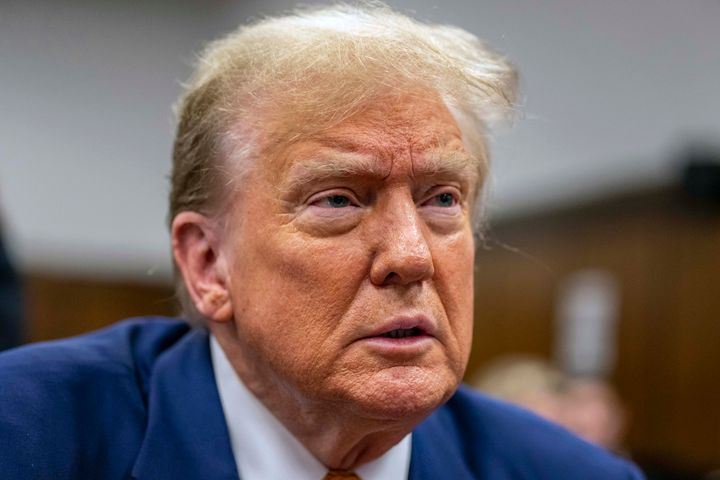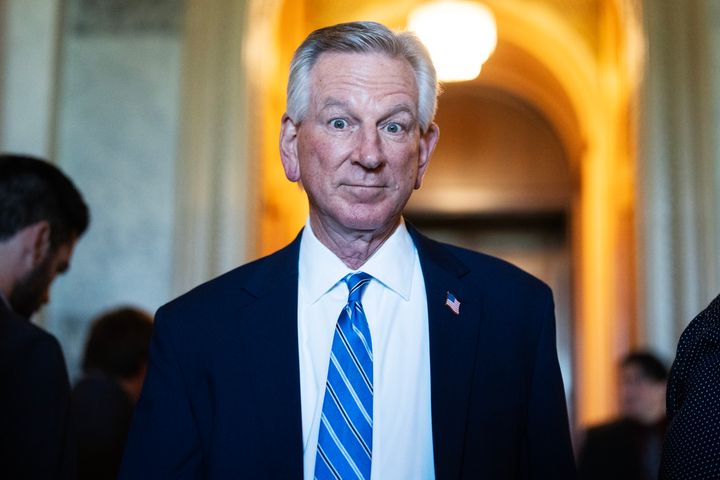WASHINGTON — Donald Trump’s claim to total immunity is a bridge too far for Senate Republicans, even some who are normally willing to say or do anything to show their support for the former president who tried to overthrow democracy.
Trump’s attorney last week argued before the Supreme Court that the presumptive 2024 GOP nominee can’t be held criminally liable for anything he did as president without being first impeached and convicted by Congress. This “absolute” immunity, the lawyer said, applied to outrageous hypotheticals posed by the justices, including a president ordering a military coup, selling nuclear secrets or directing the assassination of a political rival.
On Wednesday, GOP senators squirmed and scoffed when asked if they agree with Trump that a president is immune from being prosecuted for anything, including ordering the murder of a political opponent.
“Obviously, presidents can’t assassinate political rivals,” Sen. Ted Cruz (R-Texas) said flatly.
The court is likely to reject or sidestep Trump’s bid for total immunity, and send the case back to a lower court for more deliberation over what counts as an “official” presidential act. Trump’s team has argued that many of his actions aimed at overturning the 2020 election were part of his official duties — including when he directed the submission of fraudulent slates of alternate electors in the election, despite President Joe Biden’s victory.
“Well, I mean, there’s got to be some immunity for official acts. The question is, what are those,” said Sen. Josh Hawley (R-Mo.). “I don’t know the answer to that.”
Hawley, a lawyer himself, wouldn’t say whether he would have made the same argument about total immunity that Trump’s lawyers did before the Supreme Court.
“I’ll do my fellow lawyers the courtesy of not second-guessing them,” he said.
Is there any scenario, though, in which a president should be granted immunity for assassinating a political rival?
“I have a hard time seeing that,” Hawley finally said.
Sen. Bill Cassidy (R-La.), one of a handful of Republican senators who voted to convict Trump for inciting an insurrection, said he definitely did not agree. He mimicked a gun with his hand and pointed it at a HuffPost reporter’s head.
“I mean, could I, as president, shoot you in the head?” Cassidy said. “Of course not.”

Some GOP senators, perhaps eager to stay in Trump’s good graces, dodged the question and instead tried to compare Trump’s actions in office to Biden’s.
Sen. Tommy Tuberville (R-Ala.), one of Trump’s top allies on Capitol Hill, suggested that Biden could benefit from Trump’s arguments for immunity from prosecution because he might, somehow, face legal trouble over his administration’s policies granting student loan relief.
“I mean, presidents already have immunity, because if you don’t, they’re gonna go back — we’re gonna have a lot of people go to jail,” Tuberville said. “Yeah, especially this one going against the Supreme Court, you know, forgiving student loans.”
The Supreme Court struck down Biden’s student loan forgiveness program last year, but unlike Trump, Biden hasn’t been charged by the Justice Department and isn’t facing jail time over it.
Asked again if he agrees with Trump’s argument that presidents can get prosecutorial immunity if they order the assassination of a political opponent, Tuberville demurred.
“I ain’t gonna get in on that,” he said. “I mean, that’s crazy.”

Some Democrats warned that the Supreme Court will further risk damaging its legitimacy if it rules in Trump’s favor, or if it sends the case back to an appeals court for more deliberation. If it does the latter, that would mean Trump wouldn’t go to trial for trying to overturn the results of a presidential election, despite no evidence of the widespread voter fraud he claimed.
“This is an ongoing indication of how radical conservatives on the court have lost their way,” said Sen. Peter Welch (D-Vt.). “I mean, you ask any random person on the street, ‘Should any person be above the law, including the president?’ The answer is no.”
“That’s been part of our Constitution. It has been part of the norms of our society. And the Supreme Court is questioning that,” he added. “It’s pretty shocking.”
Strangely, only one Republican senator seemed to convey the same level of disbelief that this question is even being discussed.
“No. No. No immunity. No!” said Sen. Joni Ernst (R-Iowa). “It’s just that simple.”
“I mean, you ask any random person on the street, 'Should any person be above the law, including the president?' The answer is no.”
- Sen. Peter Welch (D-Vt.)
The closest anyone came to agreeing with Trump’s lawyers was when Sen. J.D. Vance (R-Ohio) broadly defended the concept of presidential immunity without an act of Congress. In a Wednesday interview on CNN, Vance, who has been floated as a potential running mate for Trump, declined to say where any limit should be.
“You’re basically saying that if the president orders a military coup, you believe the only remediation for that is impeachment?” CNN host Kaitlan Collins asked.
“You’re dealing with hypotheticals here that are completely outside the bounds of this situation,” Vance replied. “Donald Trump did not order a coup, despite the fact that a lot of media people say he did on January the 6th.”
Trump’s total immunity argument also carries an inherent contradiction. By arguing that a president can’t be criminally liable for anything they do without first being impeached and convicted by Congress, that would bar the Senate from convicting them because they wouldn’t be subject to the law in the first place.
As Justice Sonia Sotomayor put it to Trump’s lawyers: “If he’s not covered by the criminal law, he can’t be impeached for violating it at all.”
None of this seemed to matter to Sen. Dan Sullivan (R-Alaska), who said he hasn’t been following Trump’s case but dismissed the question about a president having total immunity because it was HuffPost asking the question.
“If a president assassinated his political rivals in America, he would be impeached,” Sullivan grumbled, climbing into a Senate subway car.
But would a president even be convicted in the Senate in this scenario, given that Republicans have already twice refused to convict Trump on serious charges? The first charges were for obstruction of justice and abuse of power, the second instance was for inciting an insurrection.
“Oh, there you go, HuffPost,” Sullivan said, visibly annoyed, as the subway car pulled him away.
The Alaska Republican refused to convict Trump on either of the two impeachment charges against him in his first Senate trial, and again in his second Senate trial.
Disclaimer: The copyright of this article belongs to the original author. Reposting this article is solely for the purpose of information dissemination and does not constitute any investment advice. If there is any infringement, please contact us immediately. We will make corrections or deletions as necessary. Thank you.
